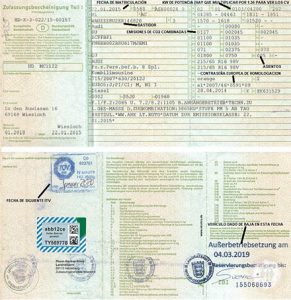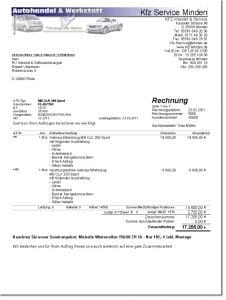Surely you have considered buying a car in Germany, and how to by do it by yourself.
Often in any group of friends they talk about importing cars, if it is worth it and the price it would cost.
Germany is an exporter by nature of all kinds of products and especially new and used cars. It has a vast automobile stock that far exceeds the volume of any other EU country. Keep in mind that only web pages like mobile.de have almost 2 million vehicles advertised daily.
The prices of the used car market in Germany are very interesting, due to the high turnover of all brands (Mercedes Benz, Audi, BMW, Porsche …) which makes anyone think of Germany as the first option to buy a car. Therefore we will explain how to buy a car in Germany and do it yourself with a practical example.
What car are we going to buy in Germany
Whether we are thinking about a new car or if we want to buy a used car, whether we are a company and we want to buy without VAT or if we are individuals, the first thing we have to be clear about is which car we want to buy.
We have to think about many things: if we want a German brand (Mercedes Benz, Audi, VW, BMW, Porsche …) or we prefer any other brand from the country it comes from (Seat, Skoda, Kia, Volvo …). The date of first registration, the mileage limit, the color, the equipment… and the final price it costs to bring a car from Germany.
Final cost of german car
In our Cost Calculator section you can calculate and compare exactly what the total price of a car imported from Germany is. Including the cost of registration tax, the cost of transport to Spain, the cost of temporary plates and end plates and the cost of the ITV in Spain.
Transport it by truck or by road
Keep in mind that if you want to bring a car yourself from Germany and drive it with temporary plates, it does not mean that it is cheaper than bringing it by truck. But it is more expensive to drive it yourself directly than in transport (in addition to what it means to be away from home for 3 or 4 days and do at least 1500 km by car).
The average price of transport by truck is € 650 while driving it yourself is much more expensive. You should know that bringing cars directly from Germany costs at least € 750. Flighticket (minimum € 50), travel from the airport to the dealership (€ 50 average), German temporary plates (from € 200 to € 350), tolls and fuel back to Spain (minimum € 300) and accommodation and food minimum € 150.
How to buy a car in Germany by yourself. Steps
Step 1: Check the car
Before you decide to buy the car, do not discard a survey to know its real condition and possible mechanical problems it has or has had previously. We work with a German certifier called DEKRA that has stations all over Germany.
Here you can learn more details about how and where to buy a car in Germany, as well as an example of a DEKRA appraisal.
Step 2: Documentation of the car
I n relation to this point we have to emphasize that it is very important to check the necessary documentation to buy a car in Germany, since if we do not do this process well we will not be able to register in Spain.
n relation to this point we have to emphasize that it is very important to check the necessary documentation to buy a car in Germany, since if we do not do this process well we will not be able to register in Spain.
Any vehicle that we want to import must have 3 German documents: Teil I (German technical data sheet) and Teil II (German vehicle registration certificate) and have COC (Certificate of Conformity) or in its absence the European homologation password without modifications.
Step 3: Price and tax regime
If we like the car and the documentation is correct, we have to negotiate the final price with the seller. We must clarify with him if that vehicle has a deductible VAT and we can buy net (in the case that we are companies or freelancers registered in the Registry of Intra-Community Operators), or otherwise it is a vehicle subject to REBU (Special Regime of Used Goods) that in Germany it is included in the German VAT Law Article 25.
Step 4: Contract or invoice
Once we are clear about how much we are going to pay and the tax regime, the seller will have to send us a contract in Spanish and in German if the seller is an individual or if they are a professional sales person, they will issue an invoice with a valid Intra-Community VAT.
 Invoice: If they issue us an invoice, they must also specify if the amount paid is Net, Gross (VAT included) or REBU.
Invoice: If they issue us an invoice, they must also specify if the amount paid is Net, Gross (VAT included) or REBU.
Both the contract and the invoice should indicate whether the vehicle is free of bumps, which in Germany is called “unfallfrei”. In the event that it has had a previous blow and it has been repaired, the ideal thing is that it is specified in that contract or in that invoice, what is the repair that has been carried out and the amount.
Many people ask about the existence of a certificate of free accident, which is totally false. This type of document does not exist in Germany, but there is much more seriousness in people who sell cars in Germany. It is usually specified in the purchase document the existence or not of previous repairs or accidents.
Step 5: Payment
Payments for most cars purchased in Germany are made by bank transfer. It is the safest way, both to ensure that the money reaches the seller correctly, and to be able to prove in the future by means of a receipt, that we have paid for that car.
There are specific cases in which the seller and the buyer agree to pay in cash. Although normally those payments should not exceed € 10,000 since it is forbidden to circulate in the European Union with more than € 10,000 in hand. In the event that a cash payment is to be made, we must obtain from the seller a receipt or proof that proves it (in addition to the invoice or contract).
Step 6: Pick up and transport
To transport a car from Germany to Spain there are two options:
Drive it on the road
If the buyer wants to drive it personally from Germany, a temporary license plate must be made, which are for 5, 15 or 30 days, and its cost ranges from 200 to 300 and a little euros approximately with a mandatory basic insurance. These temporary plates are obtained and paid for in traffic Germany, and normally require the presence of the buyer and the seller.
It must be remembered that driving it from Germany is not cheaper than bringing it by truck, but quite the opposite. To the cost of the provisional plates that we have mentioned above, we must add the cost of the flight ticket, fuel, tolls, accommodation and food during the trip. In addition to the time required to move from Germany and return to Spain.
Transport by truck
If, on the other hand, you want to lower the vehicle into a truck, which is the safest and most economical, the ideal is to collect the documentation (circulation permit, technical sheet, COC, inspection book and invoice contract) by certified mail. It´s necesary have a tracking number to avoid losing it, or having it stolen from the truck or the seller telling us that he has sent you along with the truck and then not showing up. Sending documentation by courier is quite inexpensive, and avoids important problems, because there is no use having the car if we do not have documentation.
Cars that come by truck from Germany, all come with mandatory insurance along with a document called CMR. We have to sign it when the car is delivered to us and note if it comes with any kind of scrape or scratch, in order to be able to claim the insurance company. In this article they explain well how to transport a vehicle bought in Germany safely.
Step 7: ITV in Spain
Once the car that we bought in Germany arrives in Spain, we have to request an ITV to register (it is not a periodic ITV). The cost of which is approximately € 140, and once it has passed they will give us the Spanish technical sheet.
Step 8: Registration in traffic Spain
When we have the Spanish technical sheet (from the ITV), together with the German documentation (circulation permit, technical sheet, invoice or purchase contract) we have to go to the Traffic Headquarters that correspond to us according to where we are registered, and request definitive registration.
In traffic they will make us pay the corresponding registration tax (unless the car has 120 g / km of CO2 emissions or less, in which case it will be exempt). We will have to pay minimum and mandatory fees and they will tell us to go to the municipal office to pay the municipal tax.
These are the basic and absolutely necessary steps to be able to buy a car in Germany, register it in Spain without any problem and knowing the costs with total security.
If before buying a car in Germany, you want to know exactly how much that car is going to cost us in Spain, in the cost calculator that we offer you, we can calculate it for free and down to the last cent.




